Podcast
Questions and Answers
What is the primary focus of human geography?
What is the primary focus of human geography?
- The natural features of the Earth
- Human societies and their spatial relationships (correct)
- The study of ecosystems and biodiversity
- Climate patterns and meteorological events
Which of the following best describes 'absolute location'?
Which of the following best describes 'absolute location'?
- The general area surrounding a place
- A comparative distance to other geographical features
- Exact coordinates of a place, such as latitude and longitude (correct)
- A location identified by a landmark nearby
Which theme of geography addresses the interconnectedness of countries?
Which theme of geography addresses the interconnectedness of countries?
- Location
- Sustainability
- Cultural Diversity
- Globalization (correct)
What tool is primarily used for mapping and analyzing spatial data?
What tool is primarily used for mapping and analyzing spatial data?
In geography, what does 'region' refer to?
In geography, what does 'region' refer to?
Which of the following best illustrates 'human-environment interaction'?
Which of the following best illustrates 'human-environment interaction'?
What is a significant contemporary issue addressed in geography?
What is a significant contemporary issue addressed in geography?
Which of the following is NOT a topic studied in physical geography?
Which of the following is NOT a topic studied in physical geography?
Study Notes
Definition of Geography
- Study of the Earth's landscapes, environments, and the relationships between people and their environments.
- Incorporates both physical and human aspects.
Branches of Geography
-
Physical Geography
- Examines natural processes and features (e.g., landforms, climate, ecosystems).
- Topics include geology, meteorology, and hydrology.
-
Human Geography
- Focuses on human societies, cultures, economies, and their spatial relationships.
- Topics include urban development, population distribution, and cultural landscapes.
Key Concepts
-
Location: The specific position of a place on Earth's surface.
- Absolute: Exact coordinates (latitude/longitude).
- Relative: Location in relation to other places.
-
Place: Describes the physical and human characteristics that make a location unique.
-
Region: Areas defined by certain unifying characteristics (can be physical, cultural, or political).
-
Movement: How and why people, goods, and ideas move from one location to another.
-
Human-Environment Interaction: Examines how humans adapt to and modify their environment.
Tools and Techniques
-
Maps: Visual representations of geographic areas.
- Types: Political, physical, climatic, topographic.
-
GIS (Geographic Information Systems): Software tools for mapping and analyzing spatial data.
-
Remote Sensing: Gathering data about the Earth's surface from satellites and aerial imagery.
Geographic Skills
- Ability to interpret maps and graphs.
- Understanding spatial relationships and patterns.
- Knowledge of geographical terminology and symbols.
Important Themes
- Globalization: Increasing interconnectedness among countries through trade, culture, and communication.
- Sustainability: Consideration of environmental, social, and economic factors for future generations.
- Cultural Diversity: Exploration of different cultures and their spatial distributions.
Notable Geographical Features
- Mountain ranges (e.g., Himalayas, Andes)
- Major rivers (e.g., Nile, Amazon)
- Deserts (e.g., Sahara, Gobi)
- Climate zones (e.g., tropical, arid, temperate)
Contemporary Issues
- Climate change: Impact on global weather patterns and human societies.
- Urbanization: Growth of cities and related challenges (housing, infrastructure).
- Environmental degradation: Loss of biodiversity and habitats due to human activities.
Definition of Geography
- Geography studies the Earth's physical features, environments, and the interactions between people and their environment.
- It incorporates both the physical and human aspects of the Earth.
Branches of Geography
- Physical Geography studies natural processes and features on Earth.
- Examples include landforms, climate, and ecosystems.
- It encompasses fields like Geology, Meteorology, and Hydrology.
- Human Geography focuses on human societies, cultures, economies, and their spatial relationships.
- Examples include Urban development, population distribution, and cultural landscapes.
Key Concepts in Geography
- Location refers to a place's specific position on Earth.
- Absolute location uses exact coordinates like latitude and longitude.
- Relative location describes a place's position in relation to other places.
- Place encompasses the distinctive physical and human characteristics of a location.
- Region defines areas with shared unifying characteristics. These characteristics can be physical, cultural, or political.
- Movement explains how and why people, goods, and ideas move from one location to another.
- Human-Environment Interaction explores how humans adapt to and modify their surroundings.
Tools and Techniques in Geography
- Maps provide visual representations of geographic areas.
- Examples of maps include political, physical, climatic, and topographic maps.
- GIS (Geographic Information Systems) are software tools used for mapping and analyzing spatial data.
- Remote Sensing gathers data about Earth's surface using technology like satellites and aerial imagery.
Geographic Skills
- Map and graph interpretation: Understanding how to read and analyze maps and graphs.
- Spatial Relationships and Patterns: Recognizing how locations relate to each other and identifying geographic patterns.
- Geographic Terminology and Symbols: Familiarity with geographical terms and symbols used on maps and in geographical research.
Important Themes in Geography
- Globalization: The increasing interconnectedness between countries through trade, culture, and communication.
- Sustainability: The consideration of environmental, social, and economic factors for future generations.
- Cultural Diversity: The exploration and understanding of different cultures and their spatial distributions.
Notable Geographical Features
- Mountain ranges: Examples include the Himalayas and the Andes.
- Major rivers: Examples include the Nile and the Amazon.
- Deserts: Examples include the Sahara and the Gobi.
- Climate zones: Examples include tropical, arid, and temperate zones.
Contemporary Issues in Geography
- Climate change: The impact of climate change on global weather patterns and human societies.
- Urbanization: The growth of cities and the challenges associated with it, including housing and infrastructure.
- Environmental degradation: The loss of biodiversity and habitats due to human activities.
Studying That Suits You
Use AI to generate personalized quizzes and flashcards to suit your learning preferences.
Description
Explore the fundamental concepts and branches of geography, including both physical and human aspects. This quiz covers key topics such as location, place, region, and movement, providing a comprehensive look at how geographers study the Earth's landscapes and the relationships between people and their environments.




